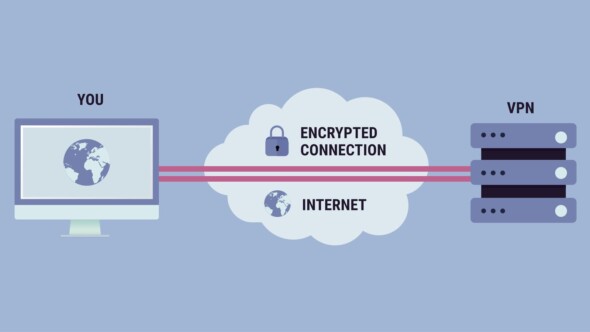The pros and cons of VPNs for gaming

Online gamers are always trying to find an edge over their opponents. When even the smallest fraction of a second counts, any tool that can increase performance is going to be highly desirable.
VPNs, traditionally a tool for online security, have become a source of much discussion in the online gaming community. Some claim they can boost connection speed and allow new games to be accessed early, whereas others believe that they only slow speeds down and risk getting you banned from gaming platforms.
In this article we will look at what VPNs can really do for gamers, examining both their benefits and their limitations. Before we start, though, let’s look at what a VPN really is.
What is a VPN?
VPNs (Virtual Private Networks) route your web traffic through one of their servers in another location, acting as a middleman between you and the games or websites you are accessing. In the process, your data is hidden from view and your activities appear to be coming from whichever location the server is in. The game or site you’re using only sees your VPN provider’s IP address in connection with your gameplay, rather than your own.
VPNs are available for PCs and smartphones, but most gaming consoles don’t support them. However, using a VPN with consoles like the XBOX One and Playstation 4 is still possible – you just need to get a router that supports VPN services instead. That way, all web traffic that goes through your router will then be protected by the VPN.
Speed up your connection
Pros
A lot of the debate around VPNs in gaming centers around speed. The main positive factor in which a VPN can affect your speeds – and your in-game latency – is if your ISP (Internet Service Provider) is throttling your gaming traffic.
Throttling is when ISPs slow down certain types of internet traffic over their network. ISPs claim to do this to better manage bandwidth between customers – but it’s quite reasonable to assume that they also do it to sell higher tier packages. ‘Unlimited’ or ‘gaming’ packages without throttling often exist, requiring gamers to pay extra to actually get the speeds they were already signed up for.
VPNs can also be a benefit to your game latency if you’re automatically assigned to a congested server. If the game you’re playing doesn’t allow you to manually change server, a VPN can increase your speeds by allowing you to switch to a server that’s less congested.
Cons
While VPNs can provide great speed benefits in theory, in reality the case is not necessarily in their favour – at least in the UK. Throttling has ceased to become a significant issue for some gamers, as many UK service providers have stopped the practice due to criticism. BT, Sky and Virgin no longer throttle connections, whereas PlusNet actually claims to prioritise traffic in favour of gamers.
However, not all gamers are as lucky as those in the UK. US Net Neutrality regulation, which required ISPs to treat all data equally, was repealed in June 2018. Unlike the UK, where competition between ISPs is fierce, much of the US is monopolised by one or other of the larger companies, and throttling is returning in full force.
Since VPNs act as an extra step between your computer and game servers, there is also a chance that extra latency will be introduced. While you won’t notice any extra latency if you’re using a high-speed VPN, some service providers may struggle to offer the high speeds required for online gaming.
Play the games you want, when you want
Pros
Geo-blocking has become far too common in the gaming world. Games are usually released at midnight in each region, which leaves UK gamers hours behind their Australian friends – and the US even further behind still. Not only are time zones an issue, some content is exclusively available only in certain countries.
With a VPN, you can switch your IP to, for example, one located in Australia, and play new games hours before they become available in the UK. In 2015, a huge number of players did exactly this to be among the first to play the long-awaited Fallout 4.
VPNs also allow you to buy, download and play games that are banned from your country. In Australia, even mainstream games such as Saints Row IV and The Witcher 2 were banned for months after release, before censored versions were eventually allowed to be sold. The list of banned games in the UK and US is smaller, but gamers studying or working abroad can also be affected, with countries like the UAE, Thailand and China having long lists of banned games.
Cons
Gaming platforms like Steam are aware of users getting around geo-blocking with VPNs, and aren’t fans of the practice. Steam has started to even go as far as to ban users they catch trying to access region-restricted content – and losing your game library is definitely not what any gamer wants. While accessing games early, or accessing banned games, is possible with a VPN, do check the rules of whichever platform or game store you use.
Get around IP bans
Pros
You don’t have to break the rules or behave unsociably to get banned from a gaming server or forum, because it’s possible someone else on your local network has gotten your entire local IP address banned. If you’ve found yourself unable to access a gaming server or forum due to the actions of a family member, housemate, or someone on your university Wi-Fi, you can use a VPN to change your IP address and get access back.
Cons
VPN IP addresses are shared between many users of the same VPN server, and thus it’s possible that you can find your new IP already banned too. However, as long as your VPN provider has a wide range of servers, you can keep switching to find one that has access.
Don’t get trolled
Pros
Disagreements in online games and gaming forums can often get heated. If another gamer happens to get excessively upset about your gameplay, they might even use a DDoS attack to get back at you.
DDoS (Distributed Denial of Service) attacks consist of a huge amount of requests – often performed by a network of virus-infected computers – being sent to one IP address. The computer or server belonging to that IP address will be overwhelmed, and will lose internet access as valid requests for webpages and games will be drowned out.
DDoS attacks can now be hired easily over the net by even those with little technical know-how, and are becoming increasingly common in the gaming community. Anyone that has your IP address can order a DDoS attack against you, but hiding your IP with with a VPN can be a form of protection.
Cons
While a VPN will definitely protect you against DDoS attacks, unless you are a well-known streamer or particularly aggravating to your fellow gamers, the likelihood that someone is actually going to spend money on a DDoS attack against you is small. This isn’t a con as such, but worth noting that you may not need to take advantage of the upshot here.
Conclusion
VPNs are a great tool for online security and keeping your internet activity private, but they won’t always boost your gameplay or give you an advantage over your competition unless you’ve opted for a superfast service. However, there are many situations where a VPN will come in handy for gamers, such as when you are going overseas and still want to access the latest gaming titles, or if you fall victim to IP bans or DDoS attacks.







No Comments